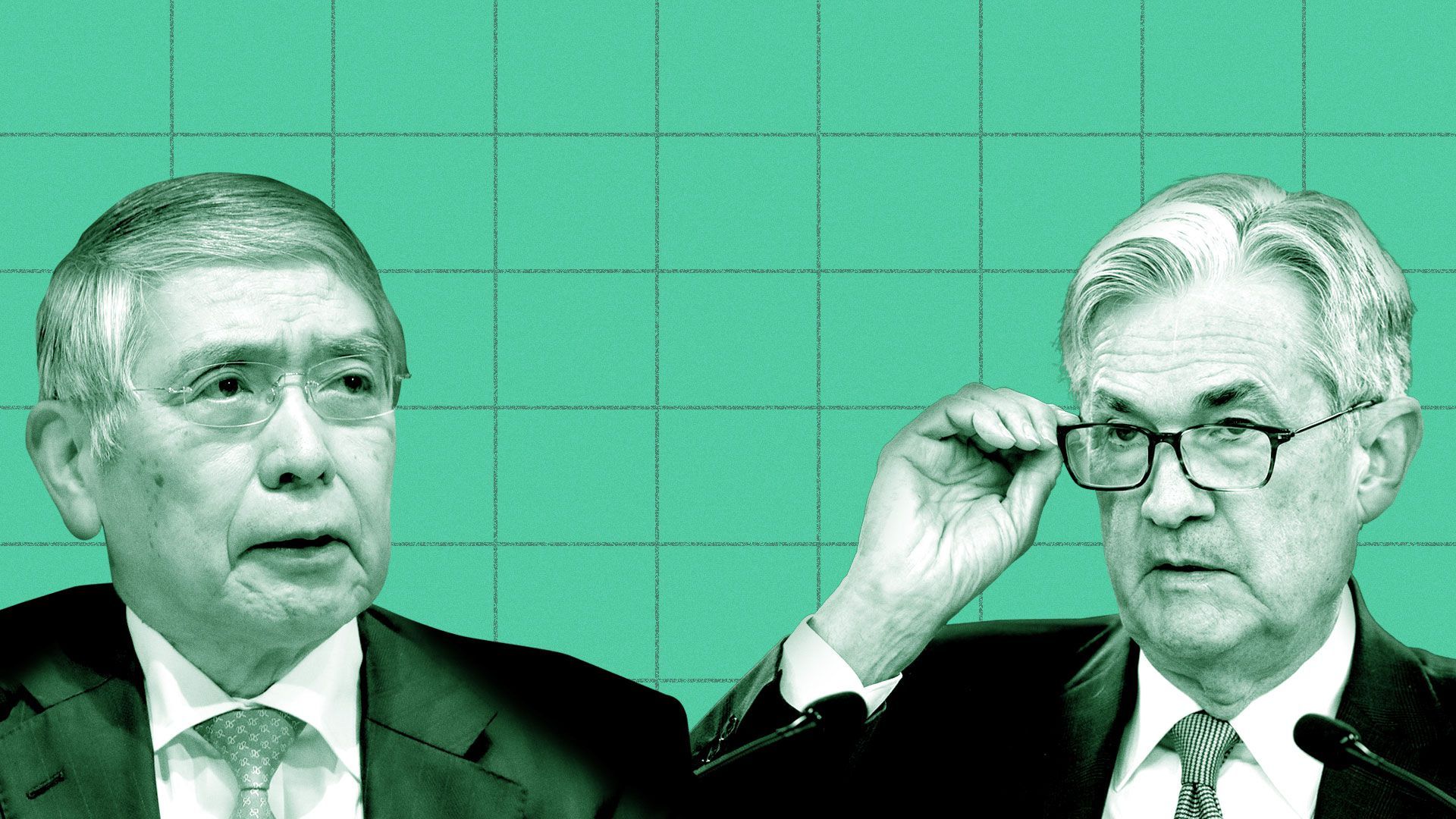| | | | | | | Presented By Public.com | | | | Axios Markets | | By Dion Rabouin ·Mar 01, 2021 | | Welcome to March! Was this email forwarded to you? Sign up here. (Today's Smart Brevity count: 1,186 words, 4.5 minutes.) 🎙 "As leaders in public affairs, American women not only worked to secure their own rights of suffrage and equal opportunity but also were principal advocates in the abolitionist, temperance, mental health reform, industrial labor and social reform movements, as well as the modern civil rights movement." - See who said it and why it matters at the bottom. | | | | | | 1 big thing: Clash of the central bankers |  | | | Photo Illustration: Eniola Odetunde/Axios. Photos: Bloomberg, Samuel Corum (Stringer)/Getty Images | | | | While Fed chair Jerome Powell is brushing off the seismic rise in government bond yields and a corresponding decline in stock prices, a group of central bankers in the Pacific are starting to take action. Driving the news: Bank of Japan governor Haruhiko Kuroda told parliament on Friday the BOJ would not allow yields on government debt to continue rising further above the BOJ's 0% target. - "It's important now to keep the entire yield curve stably low as the economy suffers the damage from COVID-19," Kuroda said, adding that the central bank plans to adjust its yield curve control program.
What it means: Kuroda is intimating that the BOJ is ready to step in and buy more bonds to push up prices and bring down yields after 10-year government debt rates rose to the highest since January 2016. Why it matters: In addition to the repricing in equities, especially tech stocks, rising inflation expectations mean rising prices for consumers in the form of costlier loans, higher gas prices and increasing costs for goods. - The rise in bond yields means a fall in bond prices, which is a capital loss for investors, and bonds have been far more popular than stocks over the last few years.
Be smart: Kuroda, who heads the central bank where inflation has been the tamest for the longest, is the most important leader to begin the process of intervening to bring down bond yields but is hardly the first. - The Reserve Bank of Australia (RBA) bought $4 billion of government bonds Thursday in order to stem falling prices, matching the record high from March 2020 when it began its quantitative easing (QE) program.
- The Bank of Korea (BOK) promised as much as $6.3 billion in new bond-buying before the end of June.
Between the lines: The central bank heads taking action — Kuroda, RBA's Philip Lowe and BOK's Lee Ju-yeol — are all classically trained macroeconomists who have been at their respective central banks for decades. - Powell, who is downplaying rising bond yields and encouraging inflation, is a trained lawyer with less than a decade of central bank experience.
What's next: The European Central Bank will publish its latest bond-buying figures at 9:45am ET and investors will get to see whether the bank significantly raised its purchases, signaling top policymakers are backing recent assurances that they won't tolerate higher yields with action. - Investors also will hear from Powell and a wide swath of Fed policymakers this week.
|     | | | | | | Bonus chart: Rates rise around the world |  Data: Investing.com; Chart: Andrew Witherspoon/Axios The rising rates are the result of an explosion of spending by federal governments, led by the U.S., to back up the explosion of money printing and lending by central banks, and increasing optimism about virus vaccines and economic recovery. - The new leaders of the world's top central banks are betting major growth will come without commensurate inflation. The old guard is not so sure.
|     | | | | | | 2. Catch up quick | | The FDA issued an emergency use authorization for Johnson & Johnson's one-shot COVID-19 vaccine. (Axios) The House passed the $1.9 trillion coronavirus relief plan, including a $15 per hour federal minimum wage stipulation, and the Senate will begin offering amendments this week. (CNBC) Warren Buffett warned of a "bleak future" for bond investors but also struck an optimistic tone in his annual letter to shareholders. (Letter) |     | | | | | | A message from Public.com | | This is your new favorite (investing) app | | |  | | | | Public.com is one part investing app, one part community where you can share ideas and get smarter alongside friends and experts. Transfer your existing portfolio to Public and they'll cover the fees. Sign up and start with $10 in free stock.* *See Public.com/disclosures/. | | | | | | 3. Protecting America against catastrophe |  | | | Illustration: Annelise Capossela/Axios | | | | Axios Capital author Felix Salmon writes: America has been hit by a series of catastrophic failures — and the only certainty is that more are on the way. Why it matters: Our infrastructure is failing, and the less we invest in it now, the more it's going to continue to fail in the future. Driving the news: Our game plan for dealing with a pandemic turned out to be grossly inadequate — but the pandemic is far from the only low-probability event to strike. - Texas was plunged into a power crisis last month, in the wake of extraordinarily cold weather.
- The entire payments infrastructure of the United States failed for about four hours on Wednesday.
The big picture: According to FEMA's latest national preparedness report, there's a long list of foreseeable events that would stress our national capabilities, possibly past the breaking point. - Earthquakes are at the top of the list. The scariest one, which could be as large as 9.2 on the Richter scale, will take place someday in the Pacific Northwest, which is ill-prepared for such a catastrophe along the Cascadia subduction zone.
- An extreme solar flare could be utterly devastating, causing a magnetic storm powerful enough to result in power outages across most or all of the country.
- A cyberattack would have a similar effect in terms of its impact on the information economy.
- Hurricanes and wildfires are now an annual occurrence, but Miami, Houston, Los Angeles and other major cities — including Washington, D.C. — have done very little in terms of beefing up their ability to withstand such events.
- The next pandemic could be much deadlier than this one, and even more disruptive.
Be smart: Resilience isn't something that can be bought with a one-off check. It's an ongoing process of modeling, pricing and wargaming. |     | | | | | | 4. Miami mayor: Bitcoin's appeal is governments can't manipulate it |  | | | Photo: "Axios on HBO" | | | | Miami Mayor Francis Suarez is pushing to make bitcoin a part of his city's economic future, and in an interview with "Axios on HBO" he pushed back against the economic orthodoxy of people like Treasury Secretary Janet Yellen who say it's a bad idea. Why it matters: Miami's inclusion of bitcoin as a way to pay city employees or as part of the city's emergency cash holdings, as Suarez has proposed, would add legitimacy to the cryptocurrency and further entrench it in the U.S. economic system. The big picture: Interest in bitcoin is largely coming from its parabolic price increase over the past year, but also from a rising distrust in government policymakers who have pushed the U.S. money supply to extreme and unprecedented levels. What he's saying: "For people who invest in bitcoin, the allure is precisely that: It's not backed by a central government. So it's not manipulatable by central government," Suarez told me during our interview. - "Obviously the federal government has the ability and the right to have their currency and to create the kind of policy that they believe will promote American values."
- "And then, that's the beauty of capitalism, people get to decide whether they want to be on one train or on the other one."
Local officials have long questioned the wisdom of Washington and the Federal Reserve, but there has been little legitimate effort by major cities to move away from the U.S. dollar. However, it's a sentiment that's clearly growing. - "You always worry about the devaluation of the dollar, but the devaluation of the dollar is based oftentimes on what the government decides to do," Suarez says.
- "It doesn't happen in a vacuum. It doesn't just happen. It happens when government takes certain action."
Where it stands: Already, Tesla — a trillion-dollar company headed by the world's richest man — has invested nearly 1/10th of its company's cash reserves into bitcoin. - Meanwhile, companies including MicroStrategy, Square and even 151-year-old insurance giant MassMutual are also putting reserves into the completely unregulated asset.
The last word: Yellen last week called bitcoin "an extremely inefficient way of conducting transactions" and a highly speculative asset. - Suarez's response: "It doesn't surprise me at all that a Treasury secretary would find a decentralized potential currency ... to be hostile to a currency that they control."
|     | | | | | | A message from Public.com | | The app that makes the stock market social | | |  | | | | Public.com is one part investing app, one part community where you can share ideas and get smarter alongside friends and experts. Transfer your existing portfolio to Public and they'll cover the fees. Sign up and start with $10 in free stock.* *See Public.com/disclosures/. | | | | Thanks for reading! Quote: "As leaders in public affairs, American women not only worked to secure their own rights of suffrage and equal opportunity but also were principal advocates in the abolitionist, temperance, mental health reform, industrial labor and social reform movements, as well as the modern civil rights movement." Why it matters: On March 1, 1987, after being petitioned by the National Women's History Project, Congress passed Public Law 100-9, which designated the month of March "Women's History Month." | | | | Axios thanks our partners for supporting our newsletters.
Sponsorship has no influence on editorial content. Axios, 3100 Clarendon Blvd, Suite 1300, Arlington VA 22201 | | | You received this email because you signed up for newsletters from Axios.
Change your preferences or unsubscribe here. | | | Was this email forwarded to you?
Sign up now to get Axios in your inbox. | | | | Follow Axios on social media:    | | | | | |







No comments:
Post a Comment